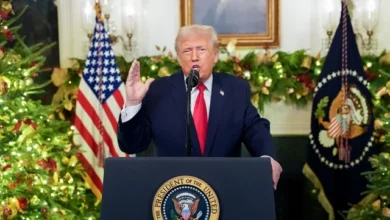Looting Of Govt property’ confirmed by Oyetola – Adeleke

The Osun State Government says it has been vindicated for what it called the recent exposure of large-scale looting of government quarters including that of the Governor, Deputy Governor and other quarters.
The State government alluded to a press statement issued by Oyetola’s Commissioner of Information, Funke Egbemode, issued on Sunday, where the admission reads as follows: “It is also important to note here that the State Commandant of the Nigerian Security and Civil Defense Corps, NSCDC, was officially informed of the looting of the official residence of Deputy Governor Gboyega Alabi and other quarters within the Government House by ‘unknown men’…. the NSCDC was notified of the ongoing looting of government properties in different quarters following the vacation of the premises by the then Governor Adegboyega Oyetola.”
A statement on Sunday by Governor Ademola Adeleke’s spokesperson, Malam Olawale Rasheed, said the admission from Oyetola’s former Commissioner vindicated the alert raised after investigation by journalists on the extensive looting.
Oyetola denies collusion
The statement signed by the former Osun State government Commissioner for Information and Civic Orientation, Funke Egbemode, Oyetola administration however debunked the allegation that Oyetola was complicit in the alleged looting.
Egbemode said the allegation was tantamount to a failed attempt by Adeleke to soil the name and good governance established by the former helmsman of the state.
Egbemode’s statement read: “We have seen the very laughable and shameless claims by the government of the day about the Government House being looted by the previous administration. The extent they have gone to peddle their falsehood is so preposterous that discerning minds are beginning to ask how a governor who completely renovated the Governor’s Lodge in June will stoop so low as to empty the First Aid box in the lodge.
She said that “Accusing a man of Oyetola’s pedigree of taking away a government house cooker and emptying bottles of methylated spirit takes away a lot from the accuser. It is beyond laughable, really.”
“Perhaps the OSBC should deploy those cameras that Governor Adegboyega Oyetola approved money for them to buy, to show the world the visuals of the Government House that Oyetola inherited and the tastefully renovated and elegantly furnished house it handed over to the Adeleke administration.
“It is also important to note here that the State Commandant of the Nigerian Security and Civil Defense Corps, NSCDC, was officially informed of the looting of the official residence of Deputy Governor Gboyega Alabi and other quarters within the Government House by ‘unknown men’.
Egbemode continued, “In a letter, with reference number SEC 43T/352, dated November 25, 2022, and signed by A.T Komolafe on behalf of the Coordinating Director, Governor’s Office, the NSCDC was notified of the ongoing looting of government properties in different quarters following the vacation of the premises by the then Governor Adegboyega Oyetola. Mr Komolafe, in the letter, asked for armed security to stop the looting in the Okefia GRA, Government House.”
Egbemode, therefore, wondered: “So, how exactly is Mr Oyetola guilty of this looting by ‘unknown men’ after he had vacated Government House? The apparent confusion of this new government keeps deepening with every new step it takes. If it has set up a review committee for stock-taking as claimed, why is it launching a media trial to force its pre-conceived conclusions down the public’s throat?”












